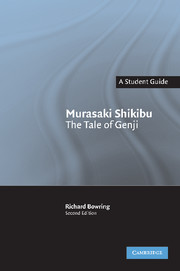3 - Language and style
Published online by Cambridge University Press: 05 June 2012
Summary
We have already had occasion to discuss women in terms of books, and men in terms of readers. When the very unavailability of Genji's real mother transforms her into an object of intense desire and causes him to set out on his involuntary search for a series of substitutes, he is in a sense condemned to producing and reading a series of translations; and translation here is to be seen not as the transference of an identifiable content from one form to another, but rather as a constant striving towards the creation of equivalence: thus while Genji desires to come close to the original, he is shifted further and further away from it. The impossibility of true synonymity is also a hard fact for the reader of translations to accept; it might be said that in Genji Murasaki Shikibu prefigures the fate of the reader. The gap between translation and ‘original’ is unfortunate, unavoidable, and by that very token of considerable importance.
Here is not the place to dilate on the particular difficulties of translating from classical Japanese, for it has been done well elsewhere, and the specific points that concern us will become clear in the course of the discussion. As it is, we are about to embark on an impossible journey, an attempt to show by English examples the stylistic richness and complexity that is the glory of the Genji.
- Type
- Chapter
- Information
- Murasaki Shikibu: The Tale of Genji , pp. 53 - 75Publisher: Cambridge University PressPrint publication year: 2003

